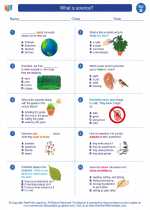Viruses
Viruses are microscopic infectious agents that can only replicate inside the cells of living hosts. They are not considered alive because they cannot carry out their own metabolic processes and rely on the host cell's machinery to reproduce.
Structure of a Virus
A typical virus consists of a core of genetic material, either DNA or RNA, surrounded by a protein coat called a capsid. Some viruses also have an outer lipid envelope derived from the host cell membrane.
How Viruses Replicate
When a virus infects a host cell, it releases its genetic material into the cell. The viral genetic material then hijacks the host cell's machinery to produce new virus particles. The newly formed viruses can then go on to infect other cells, spreading the infection.
Effects of Viruses
Viruses can cause a wide range of effects on their hosts, from mild symptoms such as the common cold to severe diseases such as HIV/AIDS, Ebola, and COVID-19. Some viruses can also cause cancer in their hosts.
Preventing Viral Infections
Preventive measures against viral infections include vaccination, practicing good hygiene, and avoiding close contact with infected individuals. Antiviral medications can also be used to treat some viral infections.
Study Guide
.◂Science Worksheets and Study Guides Second Grade. What is science?

 Worksheet/Answer key
Worksheet/Answer key
 Worksheet/Answer key
Worksheet/Answer key
 Worksheet/Answer key
Worksheet/Answer key
 Vocabulary/Answer key
Vocabulary/Answer key
